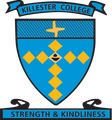Wellbeing

The Black Dog Institute are running an online webinar for parents and carers which we think would be beneficial. It is called ‘Navigating your teens mental health’ and it is running on Tuesday 19th October at 7.00pm. We would love to hear from you if you attend.
Please use this link to register: https://www.blackdoginstitute.org.au/education-services/webinars/upcoming-community-webinars/
Last term on Friday, September 10, the Year 12 students were fortunate to have an online incursion with Sonya Karras. Sonya presented her “Whole New World” Safe Partying Program. It was a mix of solid strategies and funny anecdotes whilst keeping our students informed, educated and laughing while they learned how to keep themselves and friends safe. Here is an honest and insightful reflection about Sonya’s Presentation from Ella Dawson (Year 12 St Joseph):
I really enjoyed the presentation that Sonya gave to the Year 12's. She was really informative, but also really fun and made the presentation interesting to listen to by telling us stories she's heard from other high schools and through her own experiences. I like how she took the time to listen and explain things we didn't understand, and involved us in her presentation. I also like how Sonya didn't 'shame' us for being guilty of doing the wrong thing when out 'partying', but instead gave us alternative ideas to dangerous activities. You could tell that she acknowledged that she was once a teenager too. I find with a lot of other 'safe partying' presentations in the past, the presenter came across as if they were talking down to us and just straight up telling us how to behave. There was a good level of sympathy and empathy shown from Sonya, which allowed her presentation to make more of an impact on our year level.
SCHOOLS TV
SPECIAL REPORT: Transitioning Back
As lockdown restrictions are slowly being lifted to varying degrees, we are entering a time of transition and adjustment. The circumstances of this situation have significantly impacted us all. For some it has been an opportunity to reflect on what is important, whilst others have embraced the opportunity to learn new things.
Many young people may be excited at the prospect of restrictions being lifted, whilst others may be feeling mixed emotions. Reactions will differ depending on how well they cope with stress and change. Keeping a check on your child’s mental health and wellbeing as they adjust to new routines, will be vitally important.
There is still a lot of uncertainty ahead of us, so focusing on the things you can control or enjoy doing, can help establish predictability and familiarity for the whole family. Adult carers need to provide young people with reassurance by acknowledging any concerns and fears they may have at this time. Consider this to be a normal reaction, however it may be best to focus more on their feelings and emotions, rather than the practicalities at this stage.
In this Special Report, we share a few ideas about how to help ease this time of transition. We hope you take time to reflect on the information offered in this Special Report, and as always, we welcome your feedback.
If you do have any concerns about the wellbeing of your child, please contact the school for further information or seek medical or professional help.
Here is the link to your special report https://killester.vic.schooltv.me/wellbeing_news/special-report-coronavirus-transition-back
Building resilience during the COVID pandemic
The pandemic continues to bring worry and anxiety to children and young people. Resilience can help kids get through these difficult times, but it is not something they are born with. Resilience is built up over time as kids interact with the environment and each other. Emerging relatively unscathed from a setback or hardship can boost future resilience. On the other hand, if experiences are too overwhelming or stressful, kids can be traumatised, making it difficult to respond with future hardships with resilience.
The Harvard University Centre for the Developing Child depicts resilience as ‘a see-saw or balance scale, where negative experiences tip the scale toward bad outcomes, and positive experiences tip it toward good outcomes. The point where the scale balances is called the “fulcrum,” and if it is more to one side or the other, it can make it harder or easier to tip the resilience scale to the positive.’ Everyone’s fulcrum is in a different spot—which explains why hardships impact on people so differently.
Reduce the impact of COVID by reducing stress
During the pandemic there has been a constant build-up of stress and disappointment for many kids. Remote learning, postponement or cancellation of highly anticipated events such as graduations and formals, limited access to community activities and extra-curricular activities are just some of the negative outcomes that kids have experienced.
Most of these stressors are out of parents’ control however any efforts to lighten the load on kids and tip the balance to a more positive side will help build resilience. Reducing sources of stress on kids include:
- facilitating visits to recreation areas for play and contact with friends
- ensuring academic expectations are realistic and reflect the circumstances of each child
- back and forth parent-teacher communication responding to pandemic-induced problems
- alleviating unnecessary family conflict such as temporarily loosening digital limits
Build up positive outcomes through supportive relationships
The presence of healthy supportive adult relationships with children and teenagers is a recognised contributor to resilience. Harvard University state, “The one thing that most children who develop resilience have in common is a stable, committed relationship with a supportive parent, caregiver, or other adult. Adults need those supportive relationships, too!”
Parents can build more positive outcomes for kids by strengthening the connections they have with friends, family and members of the community. Relationship-building activities can include:
- increasing family connections through shared mealtimes and enjoyable family activities
- positive one-on-one activities between parents and kids
- encouraging regular digital or face-to-face connection with friends
- maintaining contact with extended family
Strengthening core skills and coping capacities
Children and adults need a set of core skills to manage their daily lives. These skills include planning, ability to focus, self-control, self-awareness and adaptability. When children and young people are under extreme stress it’s difficult to apply these core skills so the ability to manage even simple tasks can be compromised.
Parents can strengthen these skills in children and young people by:
- building daily organisational skills at age-appropriate levels including the use of schedules, timetables and other visual organisers
- encouraging children to relax and enjoy regular downtime
- developing anxiety-management tools such as deep breathing and mindfulness
- embedding wellbeing strategies of relaxation, exercise and play into family life
Building resilience in children and young people during the current pandemic is a continuous task for families. Resilience is best promoted by relieving stressors on kids, ensuring they experience a variety of supporting relationships with adults and other children, and building core skills so that they can successfully manage their daily lives during these times of change. by Michael Grose
Michael Grose, founder of Parenting Ideas, is one of Australia’s leading parenting educators. He’s an award-winning speaker and the author of 12 books for parents including Spoonfed Generation, and the bestselling Why First Borns Rule the World and Last Borns Want to Change It. Michael is a former teacher with 15 years experience, and has 30 years experience in parenting education. He also holds a Master of Educational Studies from Monash University specialising in parenting education.
Emma Neville and Peter Harte
Assistant Principals - Students
